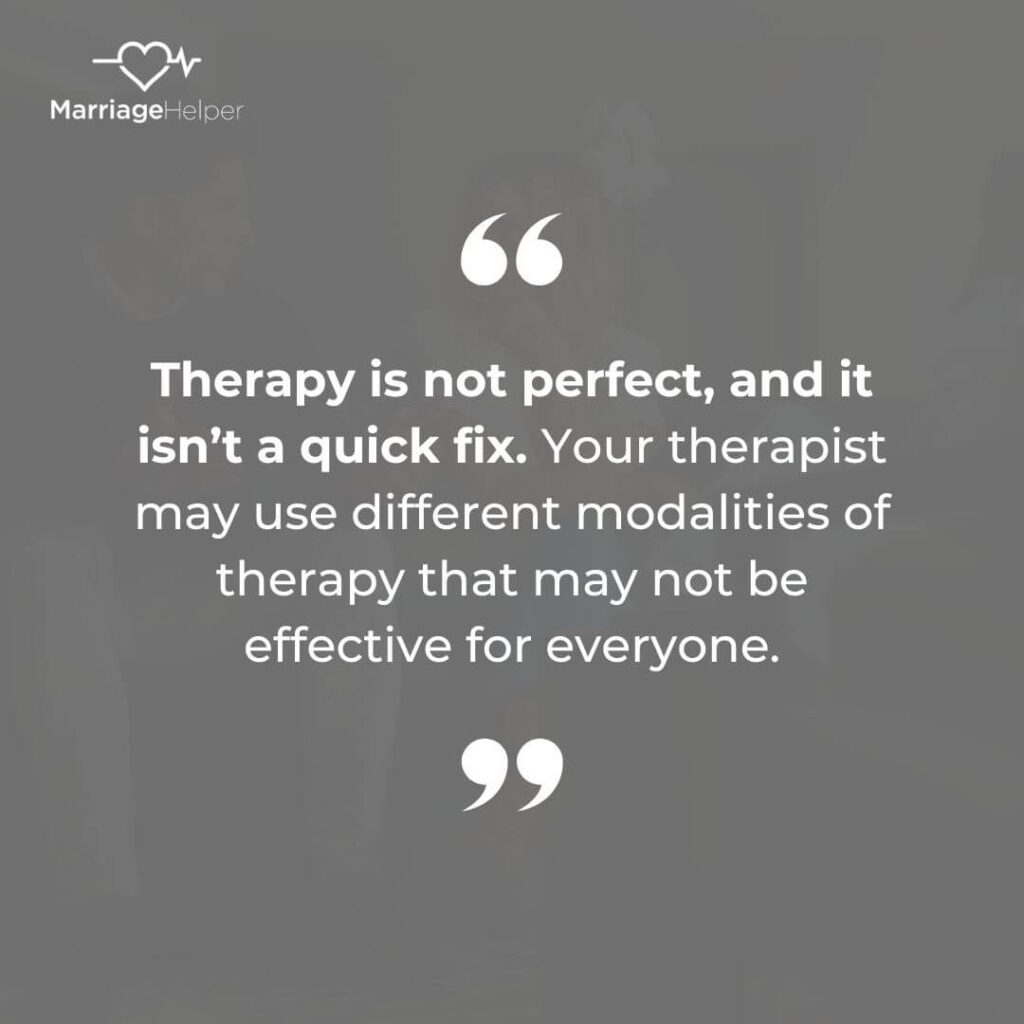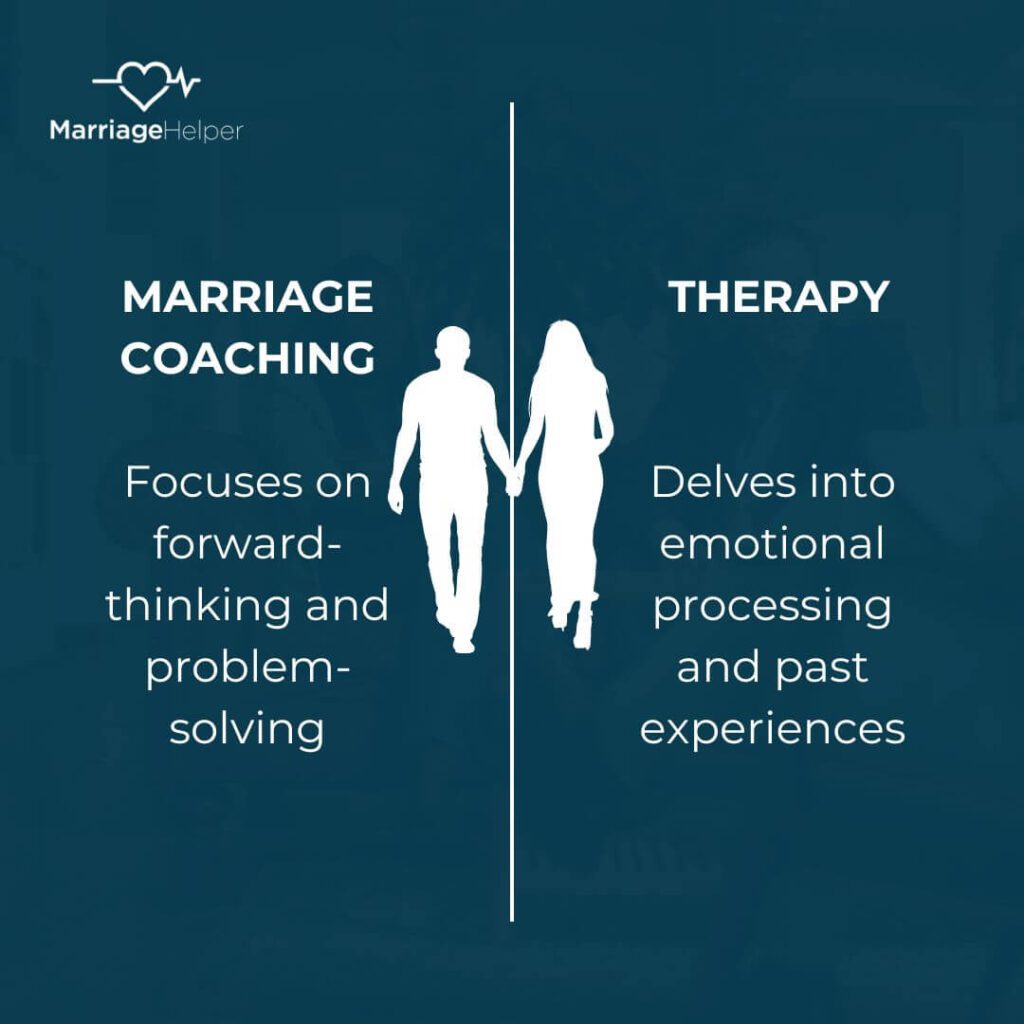
When your husband refuses therapy, navigating marital challenges can feel daunting if not impossible.
This guide offers practical, empathetic strategies for encouraging your spouse to consider therapy and other forms of relationship support.
Remember, reluctance to seek therapy is an obstacle that can be overcome.
With patience, understanding, and a willingness to explore different options, many couples find pathways to reconnect and strengthen their bond.
What to Do When Your Husband Refuses Therapy
Below are some strategies for you to follow if your husband flat-out refuses to attend therapy. The good news is that you can still take steps toward healing and strengthening your marriage.
Lead by Example
When you attend individual therapy sessions, you gain many benefits that you can share with your husband. And this may encourage him to attend sessions with you.
For instance, therapy can help you develop better coping strategies for stress and anxiety, improve your communication skills, and offer new perspectives on handling conflicts.
Seeing the positive changes in you might make your husband reconsider his thoughts on therapy.
Keep in mind that your goal is to inspire, not to coerce.
Willingness to seek therapy is far more effective when it comes from a place of personal readiness and desire for change.

Therapy is not perfect, and it isn’t a quick fix. Your therapist may use different modalities of therapy that may not be effective for everyone.
Propose a Trial Period
Offering a trial period for therapy can be a respectful way to address your husband’s hesitations.
You can suggest that he goes to just a few initial sessions.
The key here is to emphasize that this is a no-pressure situation — he can stop going if it doesn’t work out for him.
This trial is an opportunity for him to get an idea of what therapy is like, dispel any misconceptions, and see if it can offer value to him personally and to your relationship.
It’s about giving therapy a chance in a more manageable way so he feels respected and in control of his journey.
Respect His Boundaries
Understanding and respecting your husband’s boundaries within therapy is important.
Let him know that he can choose his level of engagement.
This means he can choose what topics he is comfortable discussing and can opt out of answering any questions that feel too intrusive.
He can also end a session early if he feels overwhelmed or uncomfortable.
Acknowledging these boundaries can significantly reduce his apprehensions.
So offer him a safe space where his feelings and limits are respected, potentially making him more open to the process.
Try Practical Alternatives to Therapy
If your husband is reluctant about traditional therapy, there are practical alternatives you can explore.
Introduce him to self-help resources, which can be less intimidating.
You can also try simple yet effective exercises to strengthen your relationship. Set aside time each day to talk openly about your feelings and relationship.
Regular date nights can also help you reconnect and work on your marriage in a relaxed setting.
Doing small, thoughtful acts for each other daily can also foster a stronger bond. However, both of you need to commit to saving your marriage. If your spouse wants out, then you may need to go beyond encouraging him to go to therapy.
Explore Marriage Coaching
If you’re struggling to find the right therapist, it might benefit you to explore marriage coaching.

This approach is not just an alternative to traditional therapy.
Marriage coaching is a complementary method that empowers you to make proactive, positive changes in your life and marriage.
Unlike traditional therapy which delves into emotional processing and past experiences, marriage coaching focuses on forward-thinking and problem-solving.
It helps you step back from emotional turmoil to view your situation more rationally.
At Marriage Helper, we offer marriage coaching sessions that can complement your journey in therapy.
Try a Marriage Workshop Session
Marriage workshops are also another great alternative to therapy.
In a marriage workshop, you learn in a group setting with spouses who might be going through the same issues.
This can be less intimidating for those hesitant to engage in one-on-one therapy sessions.
The group dynamic fosters a supportive environment where you can gain insights from the experiences of others, while also providing a sense of community.
It removes the pressure and replaces it with an educational, practice-oriented approach.
You can choose from solo or couples workshops depending on your situation, and the stage of your marriage crisis.
Our workshops at Marriage Helper are held online and in-person so you can attend at your own convenience.
3 Possible Reasons Your Husband Refuses Therapy
Let’s explore the possible reasons behind your husband’s reluctance to attend therapy.
It’s crucial to understand his fears, concerns, or misconceptions about the process.
Now, your role is to listen to his reasons instead of educating him. He might think therapy isn’t necessary or he may have concerns about what it involves.
Acknowledging and addressing these hesitations can help find a way forward that respects both your needs.
It’s Expensive
Worrying about the cost of therapy is a valid concern that your husband may have.
Therapy can be a significant expense, even for those with insurance coverage.
When exploring therapy options with your husband, try looking for therapists who offer more affordable session rates.
You can also look into online therapy sessions because they can be a more budget-friendly option.
It’s about finding a balance between the financial implications and the long-term benefits therapy can offer to your relationship.
Seeking professional help to save your marriage is always worth the investment.

Fear of Being Criticized or Blamed in Therapy
Many people worry that therapy might become a space where their flaws are highlighted or they’re blamed for relationship issues.
If your husband is one of these people, reassure him that this will not happen.
Tell him that a professional therapist’s role is to create a safe, neutral, and supportive environment.
Therapists are trained to facilitate discussions in a way that is non-confrontational and fair to both spouses.
They help each person express their feelings and perspectives without judgment or taking sides.
Explain that therapy is about understanding and resolving issues collaboratively, not about assigning blame.
It’s a space for both of you to learn, grow, and improve your relationship together.
Uncomfortable Sharing Feelings with Strangers
Your husband might feel uneasy about discussing personal issues with a therapist, whom he sees as a stranger.
This discomfort comes from opening up to someone they don’t know and trust yet.
In addressing this, it’s helpful to communicate that therapists are professionals trained to create a safe, non-judgmental environment.
Their role is to listen and provide guidance without imposing their judgments.
You might also suggest starting with sessions on less sensitive topics to gradually build comfort and trust with the therapist.
Over time, as he becomes more familiar with the therapist, this discomfort could decrease, allowing for more open and beneficial discussions.
Seeking Help to Save Your Marriage?
If you find yourselves needing more support and guidance, we at Marriage Helper offer a range of resources designed to assist couples in this very journey.
Our workshops provide an in-depth and supportive environment for your marital issues.
Additionally, our online membership offers ongoing support, resources, and a community of individuals who understand what you are going through.
These can help you and your spouse rebuild and rejuvenate your relationship.
Join us today, and take the first step to saving your marriage.
WE WANT TO HELP
At Marriage Helper, we’ve walked alongside thousands of couples and spent decades researching what really works to strengthen marriages. Our goal is to provide you with practical, research-backed guidance—like the free information you’ve found on this page—because we genuinely care about helping marriages thrive. If you’re ready to go deeper, our workshops, membership, and one-on-one coaching offer even more tools, insights, and personalized support to help you navigate your unique journey and create lasting change in your relationship.
Our intensive Marriage Helper Workshop has a remarkable 70% success rate in saving marriages, even if your spouse is reluctant or unwilling to participate. And here’s what’s even more encouraging: 99% of participants recommend our program to others, regardless of their ultimate outcome.
Learn more about:





